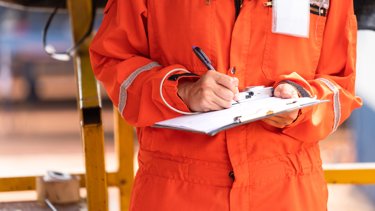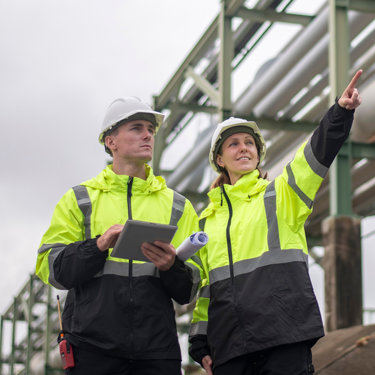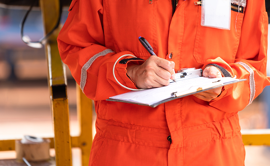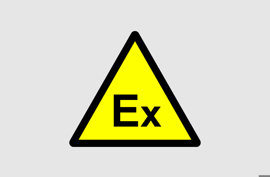
DSEAR risk assessment and compliance
Ready to discuss your project?
Please leave your details and a member of our team will reach out to discuss your requirements in more detail and arrange next steps.
We help you identify, assess, and mitigate the risks of fire, explosion, and hazardous substances in the workplace with our comprehensive, industry-leading DSEAR compliance services. This ensures your business is compliant with the Dangerous Substances and Explosive Atmospheres Regulations (DSEAR) and prepared for Health and Safety Executive (HSE) scrutiny.
It's important to act now as the HSE is increasing proactive interventions. If an incident occurs, they will ask whether you have done everything reasonably practicable to prevent this – and if you can't answer confidently, then you're exposed.
What is DSEAR?
The Dangerous Substances and Explosive Atmospheres Regulations 2002 (DSEAR) require employers to control the risks from fire, explosions, and substances corrosive to metals. If your site handles flammable gases, vapours, dusts, or chemicals, you are legally obligated to assess and manage these risks.
Failure to comply can result in
Unlimited fines
For serious breaches of DSEAR, courts can impose unlimited fines and/or imprisonment for up to two years.
Prosecution
In some instances, individuals can be imprisoned for serious breaches of DSEAR.
Corporate manslaughter charges
Corporate manslaughter charges can be brought against organisations, including those failing to comply with DSEAR regulations, if their negligence results in a death.
Enforcement
HSE may issue notices (e.g., prohibition or improvement notices) requiring businesses to rectify issues identified during inspections.
Operational downtime
In extreme cases, non-compliance could lead to the temporary or permanent closure of business operations.
Examples of processes covered by DSEAR include:
- storage of petrol as a fuel for cars, boats or horticultural machinery
- use of flammable gases, such as acetylene, for welding
- handling and storage of waste dusts in a range of manufacturing industries
- handling and storage of flammable wastes such as fuel oils
- work that could release naturally occurring flammable substances such as methane at landfill sites
- storage and display of flammable goods, such as paints, in shops
- filling, storing and handling aerosols with flammable propellants such as LPG
- transporting flammable substances in containers around a workplace
- chemical manufacturing, processing and warehousing
- the petrochemical industry, both onshore and offshore
Our DSEAR compliance services
Once risks have been identified under DSEAR they must be eliminated or reduced as far as reasonably practicable. We deliver a full suite of DSEAR services tailored to your sector and risk profile:
1. DSEAR risk assessment
We identify and evaluate fire and explosion hazards across your site, triaging faults so you know what poses the highest risk, and can tackle those first.
2. Explosion Protection Document (EPD)
We support with the review and build of this legally required document that includes:
- Risk assessment
- Engineering policies and procedures
- ATEX asset register
- Hazardous area classification drawings
- Competency assessments
3. Hazardous area drawings
Produced using EI15 and BS EN 60079-10 standards, our drawings clearly define risk zones and support safe system design.
4. ATEX compliance checks
Our annual inspections and full 3-year reviews of ATEX-rated equipment ensure it is correctly specified and selected.
5. Competency & training audits
We assess staff training schemes (e.g. COMPEX) and ensure your team is qualified to manage explosive risks.
6. Scheduled maintenance regimes
We help you implement proactive inspection and maintenance plans to carry out modifications or fix faults to stay compliant and reduce risk.
When should you do a DSEAR assessment?
We recommend setting up a regular audit plan of your DSEAR assessments for every 3-5 years, or alternatively if your processes have changed.

Why Adler & Allan?
Expertise
30 years expertise across water, gas, energy, data centres, and industrial sectors
Qualified
Our team are Hazardous Area and Process safety specialists, have CompEx 12 and 14, and are registered Functional Safety Engineers
Compliance
Replicable process for scalable compliance across multiple sites
Trusted by regulators
Demonstrate to the HSE that you’re taking proactive steps
Remediation-ready
We don’t just assess; we help you fix what’s needed
Environmental compliance today, creating a sustainable tomorrow
Helping you reduce risk to the environment and your operation by managing assets compliantly while achieving commercial, ESG, and net-zero goals.
Contact our experts


